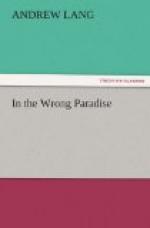Among animals the cow is sacred to Gladstone; and, in works of art, gems and vases (or “jam-pots"), he is represented with the cow at his feet, like the mouse of Horus, of Apollo Smintheus, and of the Japanese God of Plenty (see an ivory in the Henley Collection). How are we to explain the companionship of the cow? At other times the Sun-hero sits between the horns of the Cow-Goddess Dilemma, worshipped at Westminster. (Compare Brugsch, “Religion und Mythologie der alten Aegypter,” p. 168, “Die Darstellungen Zeigen uns den Sonnengott zwischen den Hornern der Kuh sitzend.”) The idea of Le Page Renouf, and of Pierret and De Rouge, is that the cow is a symbol of some Gladstonian attribute, perhaps “squeezability,” a quality attributed to the hero by certain Irish minstrels. I regard it as more probable that the cow is (as in the Veda) the rain-cloud, released from prison by Gladstone, as by Indra. At the same time the cow, in the Veda, stands for Heaven, Earth, Dawn, Night, Cloud, Rivers, Thunder, Sacrifice, Prayer, and Soma. We thus have a wide field to choose from, nor is our selection of very much importance, as any, or all, of these interpretations will be welcomed by Sanskrit scholars. The followers of McLennan have long ago been purged out of the land by the edict of Oxford against this sect of mythological heretics. They would doubtless have maintained that the cow was Gladstone’s totem, or family crest, and that, like other totemists, he was forbidden to eat beef.
It is curious that on some old and worn coins we detect a half-obliterated male figure lurking behind the cow. The inscription may be read “Jo,” or “Io,” and appears to indicate Io, the cow-maiden of Greek myth (see the “Prometheus” of AEschylus).
Another proof of the mythical character of Gladstone is the number of his birthplaces. Many cities claimed the honour of being his cradle, exactly as in the cases of Apollo and Irving. Their claims were allowed by the Deity. (Compare Callimachus, Hymn to Apollo.)




